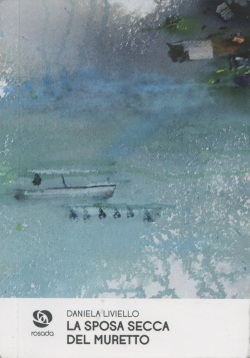Editorial
by Francesca Del Moro
Alessandro Silva beautifully synthesises the story of his tree planter—who in his polished verses becomes almost a God, creator of a heaven on earth—and cyclically ends his poem with water replacing the dryness of the beginning. Alfonso Tramontano Guerritore focuses on the personality of the main character, presented as some kind of visionary “natural architect”, who stubbornly chases a dream that would seem unattainable to anybody else. Rita Stanzione gives the floor to his planter who pictures himself as a seed, as a rebirth of nature and of glorious architectures triumphing over pitiless seasons and dry lands. In his evocative poem, Paolo Polvani takes the point of view of a traveller who admires the result of such a hard work, embracing the invitation to melt with nature which comes from the personifications of some olive trees.
Jonah who planted trees
by Alessandro Silva
The spring dried by the coarse wind
in those five or four rare villages
on the slopes (where they already
suffer the egoism
of summer
those twenty thousand people, in skeletal
solitude). The man spoke little
about it, clothes of greasy stone
feet of steel.
He said it came
from the bowels of a monster: tightest
antiquity of relationships in that mixture
of Jonah and virtue that nothing could
trouble him.
A worm came down to him and
gnawed the wooden weeds. Seeds
came from willows and rushes, and water on
carpets of mint. They made hoedown,
the grazing lands
of newcomers.
Also three young plastered girls
devoid of everything, for mercy
and prayers at hands.
He would die that man
like a drop of water in the sea.
The olive trees
by Paolo Polvani
Look at us, whisper the olive trees in the faint
light of a nightfall, we are your
breath.
I drive.
The hint of a smile never leaves me,
a wrinkle, a whim of foolish bliss.
The night discloses a window. I turn on
the headlights. – We are your itinerary, your
torment –. The jacket lies reclined on the seat.
A song faintly fades away, whose words
I do not know but obsessively repeat and invent and invert,
its words of surrender and abandon.
We are dwelling, say the olive trees, in
the gap of your gaze,
we are a little taste, a promise,
a cry, a breath, a scratch of happiness.
From that native green love
by Rita Stanzione
I see me under this earth
as a seed, at the sterile foot of the blinds
at the dark sun of the winter
a panting seed
at the many years of the river drying up
and muttering something
about charred stones.
Through the windowsills
slowly bending on the cliffs
I see you
houses of thorns
shadowless in a beloved season
you know the poverty of weapons and bitter breads
the harvest of gusts
that don’t remit rustles, not one single
leaf from that native green love.
From now on I’ll be planting you until the end
as a silent trace of survival
that sands stole from water.
From now on a relentless
deluge everywhere I look
before my step
another instant of forest
physiognomy of a womb that is filling up.
Time will pass
by Alfonso Tramontano Guerritore
Time will pass
surely not in vain
given the stubbornness
and the natural factors
I have a plan
that let the world make
its own law: I bring the seeds
I bring the caring due to
desire. And perseverance
will only need
the path of water
the seasons on earth
then the making of palaces
of living wood, shadow and proportion
will have depended on me
only on the strength
of a desire
the part of a dream, then the leaves
I do know that in that place
there was hardly anything
you did not believe me but
that huge wood
I saw it already
La sposa secca del muretto
by Daniela Liviello
“I would be the dry bride of the wall / the song and wind of the leaves / I would be the flat stone of the threshold”: we must get almost to the end of this book to find some clue about its mysterious title. We visualize a dried—almost fossil—fern on a village wall. After all, the poems convey the constant yearning to be one with the place: a village in the South of Italy which—given the author’s origin—is likely to be located in the Salento area, but at the same time symbolizes a peculiar world obeying to natural rhythms and human rituals. It’s “the mirror of a wider South, a window over the Mediterranean Sea, which has always been tormented and nowadays is all the more suffering” as the author states in the acknowledgments. It’s a South that “doesn’t bridge the gap” and the bride slowly travels through this land, answering the primordial call to establish a permanent connection with it. Walking through familiar streets, the poet shares with us the main details she meets along the path, evoking those “natural figures” referred to in the epigraph by Pavese. It’s not our choice to see them, but they “can rise” at the right time; so, the village reveals itself little by little, or rather ‘happens’ in a succession of epiphanies. Most of the time, a line or even a word is enough to build architectures, streets and squares, to gather crowds and show towering trees, wide skies, and lively glimpses of landscapes. Meanwhile the path, marked on several occasions by the ‘steps’, continues with some kind of concern. “We sink in muddy waters, / ships looking for their course” as the first lines warn, and the following specify that the lighthouse is turned off, and everywhere is silence, except for a short breath. It’s the breath of the living earth, a seemingly unwelcoming, threatening and threatened land, at the mercy of the wind, the storm, the blizzard, but also of human beings, who come to demolish and enclose. Sometimes, the language overflows in sequences of words conveying the danger of attacks, gashes, collapses. A sense of fear (through the recurrence of words such as ‘spavento’ / ‘spaventare’: ‘fright’ / ‘frighten’) is born from the precariousness of the place and of our own life, also undermined by poor harvests, and fires that nullify people’s daily work. While reading, one can feel the risk to be wiped out, a risk contrasted by the solidity of the omnipresent rock, the weight of the enduring land, of human efforts and recurring feasts and religious processions. And when you feel like an autumn leaf falling or a drop evaporating, you grab on to roots, to the fathers and saints who patiently worked to put the seeds into the ruts, and multiply loaves and fishes. Fathers and saints mean continuity and belonging, they are witnesses to a past when people used to gather in the squares to discuss, when doors were kept open to let fresh air come inside and you could fool misery by just staying together. Today, all this sharing has been replaced by locked doors, cliffs between the rooms, silences. We just meet in processions, “looking each other wearing out”, with the growing fear that someday it will become impossible to recognise people from stones facing the sea, that people could change into an expanse of white statues, as foretold in one of the last poems. A prophecy eased by language, which often conveys a sense of coldness and firmness. A vivid language, sometimes trenchant and sometimes hieratic, that hangs us, makes us hold our breath, and finally hits with the last lines, or even with the very last, isolated line: a fulmen in clausula. An unadorned language that is heavy like earth and shines like rock, weaves an embroidery of sound figures and saddle stitches of recurring words, sews each poem to the following, uniting them into a wider composition corresponding with the whole collection. This is the wedding song for a relentless land, one that nevertheless conveys a dazzling beauty, with the air meandering through the branches, the motionless and wonderful dawn, a land-body covered by the light blue veil of the sky.
Daniela Liviello
La sposa secca del muretto
Edizioni Kurumuny, 2018

